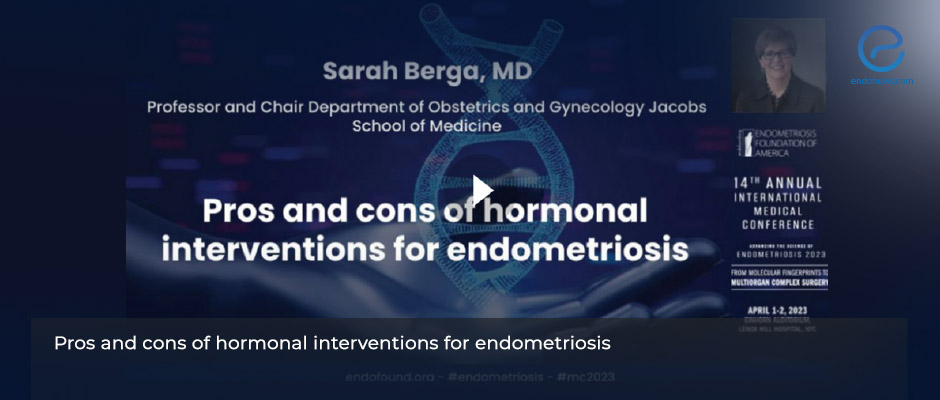2023 MedicalConferance: Pros and cons of hormonal interventions for endometriosis - Sarah Berga, MD
May 1, 2023
Neither with you nor without you: hormonal treatments for endometriosis
Key Points
Highlights:
- Prof. Sarah Berga, MD., Chair of Ob&Gyn at Jacobs School of Medicine and Biomed Sci., presented this speech at the 2023 EFA Medical Conference.
- Hormonal interventions are a common treatment for endometriosis and include oral contraceptives, progestins, GnRH agonists, and aromatase inhibitors.
- Each hormonal intervention has its own pros and cons, and a personalized approach is needed to determine the best course of treatment for each patient.
Importance:
- Endometriosis can have a significant impact on quality of life, and effective treatment is necessary to alleviate symptoms and improve overall well-being.
- Hormonal interventions are often used as a first-line treatment for endometriosis and can effectively reduce pain and endometriotic lesions.
- Understanding the pros and cons of each hormonal intervention is important for medical professionals to make informed decisions about the best course of treatment for their patients.
Key results:
- Oral contraceptives can suppress ovulation, reduce estrogen levels, and decrease the size and number of endometriotic lesions, but may not be effective for all women and can have side effects such as irregular bleeding and mood changes.
- Progestins can thin the endometrial lining and reduce inflammation but may also have side effects such as weight gain and decreased bone density.
- GnRH agonists can suppress ovarian function and reduce estrogen levels but can cause menopausal symptoms such as hot flashes and vaginal dryness and can lead to bone loss.
- Aromatase inhibitors can reduce pain and inflammation in women with endometriosis but may also have side effects such as joint pain, decreased bone density, and lipid abnormalities.
Limitations:
- There is no one-size-fits-all approach to endometriosis treatment, and each patient's unique medical history, symptoms, and preferences must be considered.
- Hormonal interventions can have significant side effects, such as bone loss, which must be monitored and managed appropriately.
- Other treatment options, such as surgery and alternative therapies, may be necessary for some women with endometriosis, and a multidisciplinary approach is often needed to manage this complex condition.
Lay Summary
Prof. Berga, MD., who is the Chair of Ob&Gyn at Jacobs School Medicine and Biomed Sciences, presented this speech at the 2023 EFA Medical Conference.
Dr. Berga explains that the primary goals of endometriosis treatment are to reduce pain and improve quality of life, preserve fertility, and minimize side effects.
She then goes on to discuss the different hormonal interventions available for endometriosis. Oral contraceptives are a common first-line treatment, as they can suppress ovulation, reduce estrogen levels, and decrease the size and number of endometriotic lesions. However, oral contraceptives may not be effective for all women with endometriosis and can have side effects such as irregular bleeding, headaches, and mood changes. Progestins are another option for endometriosis treatment, and they can be given in several forms including pills, injections, or implants. Progestins work by thinning the endometrial lining and reducing inflammation, which can alleviate pain and bleeding. However, they may also have side effects such as weight gain, acne, and decreased bone density. Gonadotropin-releasing hormone agonists are a third option for endometriosis treatment, and they work by suppressing ovarian function and reducing estrogen levels. While effective in reducing pain and endometriotic lesions, Gonadotropin-releasing hormone agonists can cause menopausal symptoms such as hot flashes and vaginal dryness. They can also lead to bone loss, so monitoring bone density and supplementing it with calcium and vitamin D if necessary is important. Aromatase inhibitors, which block the conversion of androgens to estrogens, are a newer option for endometriosis treatment. They can reduce pain and inflammation in women with endometriosis but may also have side effects such as joint pain, decreased bone density, and lipid abnormalities.
Dr. Berga emphasizes that there is no one-size-fits-all approach to endometriosis treatment and that each patient's unique medical history, symptoms, and preferences must be considered. She also highlights the importance of monitoring for potential side effects, especially bone loss, and providing appropriate supplementation or alternative therapies as needed.
In conclusion, Dr. Berga's speech provides a detailed overview of the hormonal interventions available for endometriosis treatment, helping medical professionals make informed decisions about the best course of treatment for their patients while minimizing side effects and preserving fertility.
hormonal treatments endometriosis Oral contraceptive Progestin Gonadotropin-releasing hormone GnRH Aromatase inhibitors

